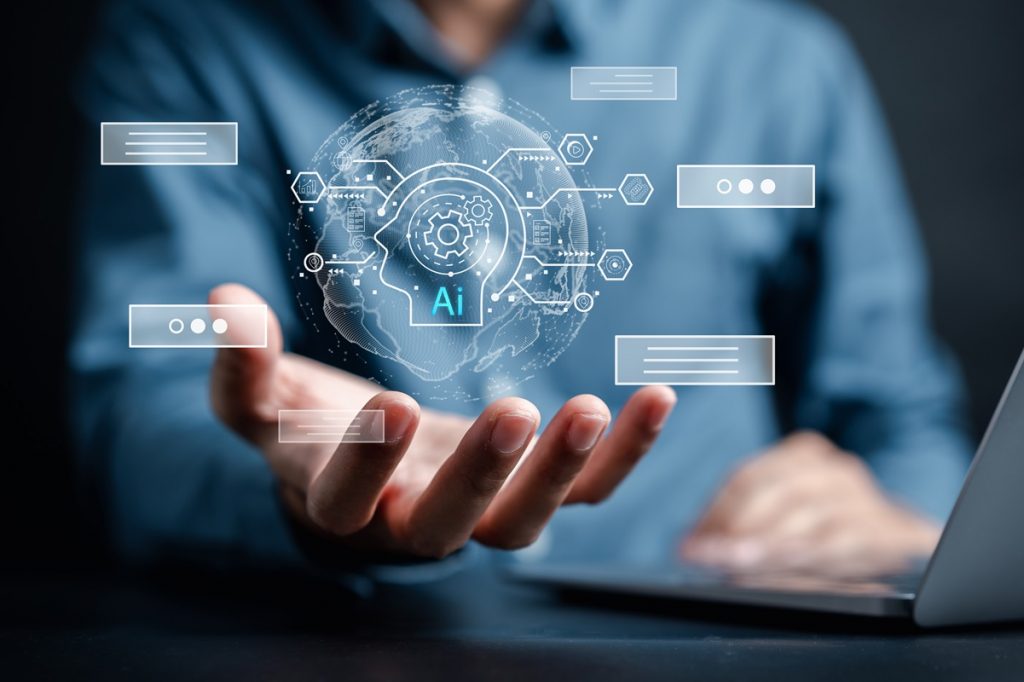AI is rapidly altering the landscape of the job market. While some may view this change with apprehension, fearing widespread job displacement, it’s crucial to recognise the transformative potential of AI as a powerful collaborator, not a competitor. By analysing the evolving work landscape, the reskilling required, and the types of roles potentially impacted by AI, we can gain insights into how professionals can prepare for the future of work.
One of the most significant effects of AI is automation, particularly of repetitive tasks. Roles heavily reliant on such tasks, like data entry clerks, assembly line workers, and some customer service representatives may face potential displacement. However, this doesn’t necessarily equate to widespread job losses. Instead, it’s more likely to lead to a shift in skill sets required for success.
By way of example, consider the role of a radiologist. While AI can analyse medical scans with impressive accuracy, it lacks the human touch and nuanced judgment required for a definitive diagnosis. The future of effective AI-driven medicine instead lies in human-AI collaboration, where radiologists leverage AI’s efficiency to analyse large datasets, freeing up their time to focus on complex cases and patient interaction, maximising their human expertise.
This collaborative approach is necessitating changes in professional skillsets:
- AI specialists and developers: These individuals will be responsible for building, maintaining, and evolving AI technologies, ensuring their effectiveness and ethical application.
- Data scientists and analysts with domain expertise: The ability to bridge the gap between data and specific industry knowledge will be crucial in extracting valuable insights from the vast amount of data generated by AI systems.
- User experience and human-computer interaction specialists: As AI becomes more integrated into our daily lives, designing seamless and intuitive user interfaces will be essential.
- Creative professionals who can collaborate with AI tools: From copywriters utilising AI-powered language models to generate content outlines, to graphic designers working alongside AI to create unique visuals, the ability to leverage AI tools to enhance creativity will be highly sought-after.
Furthermore, emerging roles are taking shape within the AI ecosystem itself, demanding specialised expertise. These include:
- AI Ethics Officer: As AI becomes more sophisticated, ensuring its development and implementation adheres to ethical principles will be paramount.
- Data privacy specialist: Protecting user data and ensuring compliance with regulations will be crucial in the AI-driven world.
- AI-assisted healthcare provider: Healthcare professionals working alongside AI-powered diagnostic tools and virtual assistants will be able to offer patients more efficient and personalised care.
- AI implementation strategist: These individuals will be responsible for devising and executing strategies for integrating AI effectively within organisations.
Beyond Reskilling – Embracing AI Collaboration
While reskilling and embracing collaboration with AI are crucial steps, the conversation around the Generative AI revolution extends beyond individual adaptation. To fully harness the potential of this technology and navigate the complex landscape it presents, we must consider broader societal and ethical considerations.
1. The Rise of the “Augmented Workforce”
Imagine a world where AI acts as an extension of human capabilities, augmenting our skills and enhancing our performance. This augmented workforce could see professionals leveraging AI for tasks like data analysis, report generation, or customer service inquiries, freeing up their time for higher-order thinking, strategic planning, and creative endeavors. This necessitates a shift in mindset, moving beyond viewing AI as a replacement and embracing its potential to amplify human expertise.
2. The Democratisation of Expertise
Generative AI has the potential to democratise expertise by making sophisticated tools and knowledge more accessible. Imagine an AI-powered legal assistant that guides entrepreneurs through basic legal procedures, or a healthcare chatbot that provides preliminary diagnoses based on user-reported symptoms. This democratisation can bridge the gap between skilled professionals and the general population, making expertise more widely available and reducing reliance on scarce resources. However, it’s crucial to emphasise that AI tools should complement, not replace, the need for qualified professionals in critical areas.
3. The Need for Ethical Frameworks and Regulations
As AI becomes more pervasive, developing robust ethical frameworks and regulations is crucial. This includes addressing issues like bias in AI algorithms, transparency in decision-making processes, and the use of AI for harmful purposes. The responsibility lies not only with developers and policymakers but also with individuals to hold technology accountable and advocate for ethical development and use of AI.
4. Reskilling for an AI Workforce
The educational landscape needs to adapt to equip future generations with the necessary skills to navigate the AI-driven world. This may involve incorporating AI literacy into curriculums, fostering critical thinking and problem-solving skills, and promoting collaboration and adaptability. Educational institutions and individuals alike must embrace lifelong learning to constantly update their skillsets and remain relevant in the evolving job market.
5. The Human-Centric Approach
Ultimately, the focus must remain on human-centricity. Technology, including AI, is a tool; its purpose should be to enhance the human experience, augment our capabilities, and improve our lives. Whether it’s through ethical considerations, fostering human-AI collaboration, or leveraging technology to address global challenges, prioritising the human element will be key to navigating the future of work and ensuring a beneficial and equitable integration of AI into society.
By engaging in these discussions and actively shaping the narrative around AI, we can ensure that this technology serves as a force for good, empowering individuals, organisations, and society as a whole to thrive in the generative age.
The key takeaway lies in acknowledging the potential for AI to transform, not to replace. By embracing continuous learning, reskilling, and developing an aptitude for collaboration with AI tools, individuals can not only survive but thrive in the evolving job market.
Whether it’s acquiring expertise in data analysis, learning creative skills to work alongside AI, or pursuing specialised roles within the AI ecosystem itself, adaptability and a willingness towards reskilling will be the cornerstones of success in the age of generative AI.
This content was generated with the assistance of AI tools. However, it has undergone thorough human review, editing, and approval to ensure its accuracy, coherence, and quality. While AI technology played a role in its creation, the final version reflects the expertise and judgment of our human editors.


